Skool vs Circle: Which Community Platform Is Right for You? (2025)

If you’re trying to grow Skool community or build an online membership platform, you may have found yourself at a crossroads between Skool and Circle. Both platforms offer compelling features to create engaging communities, but which one is truly the best fit for your needs? In this detailed guide, we’ll explore the strengths and limitations of both Circle and Skool, helping you make an informed decision that aligns with your goals.
Drawing on expert insights and real-world examples, this article will walk you through the core features shared by both platforms, what Circle offers beyond Skool, and where Skool stands out. By the end, you’ll have a clear understanding of how to grow Skool community effectively and whether Skool or Circle is the right platform for your online community.
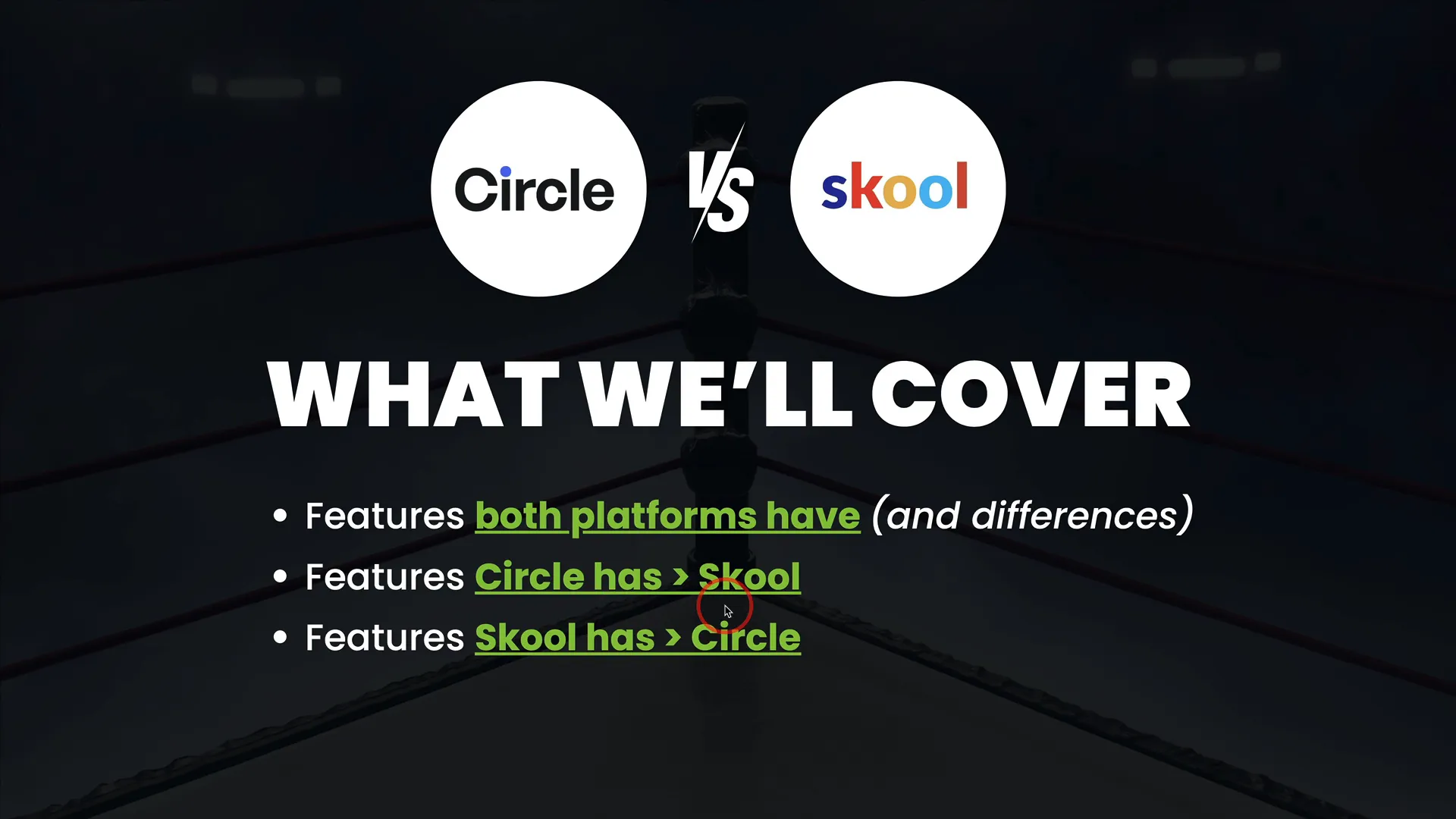
Table of Contents
- Step 1: Understand the Shared Features of Circle and Skool
- Step 2: Explore What Circle Offers Beyond Skool
- Step 3: Recognize the Strengths of Skool Over Circle
- Step 4: Weighing Your Options – Which Platform is Right for You?
- Step 5: Tips for Growing Your Skool Community
- FAQ: Growing Skool Community and Platform Comparisons
- Conclusion: Making the Right Choice to Grow Skool Community
Step 1: Understand the Shared Features of Circle and Skool
Before diving into the unique strengths of each platform, it’s crucial to understand the foundational features both Circle and Skool provide. Both platforms offer essential tools for online communities and memberships, including courses, forums, events, native payment options, member directories, messaging, gamification, mobile apps, and roadmaps. However, the depth and customization of these features vary significantly.
Courses
Both Circle and Skool support courses as a core component of their community structure. For example, in Circle, courses are integrated within spaces and can be customized extensively. Skool labels their course section as “Classroom,” which provides a similar learning environment but with less customization flexibility.
While both platforms allow you to create and host courses, Circle’s ability to customize each course extensively offers more control over the learning experience. This can include personalized course layouts, content organization, and access settings tailored to different membership tiers.
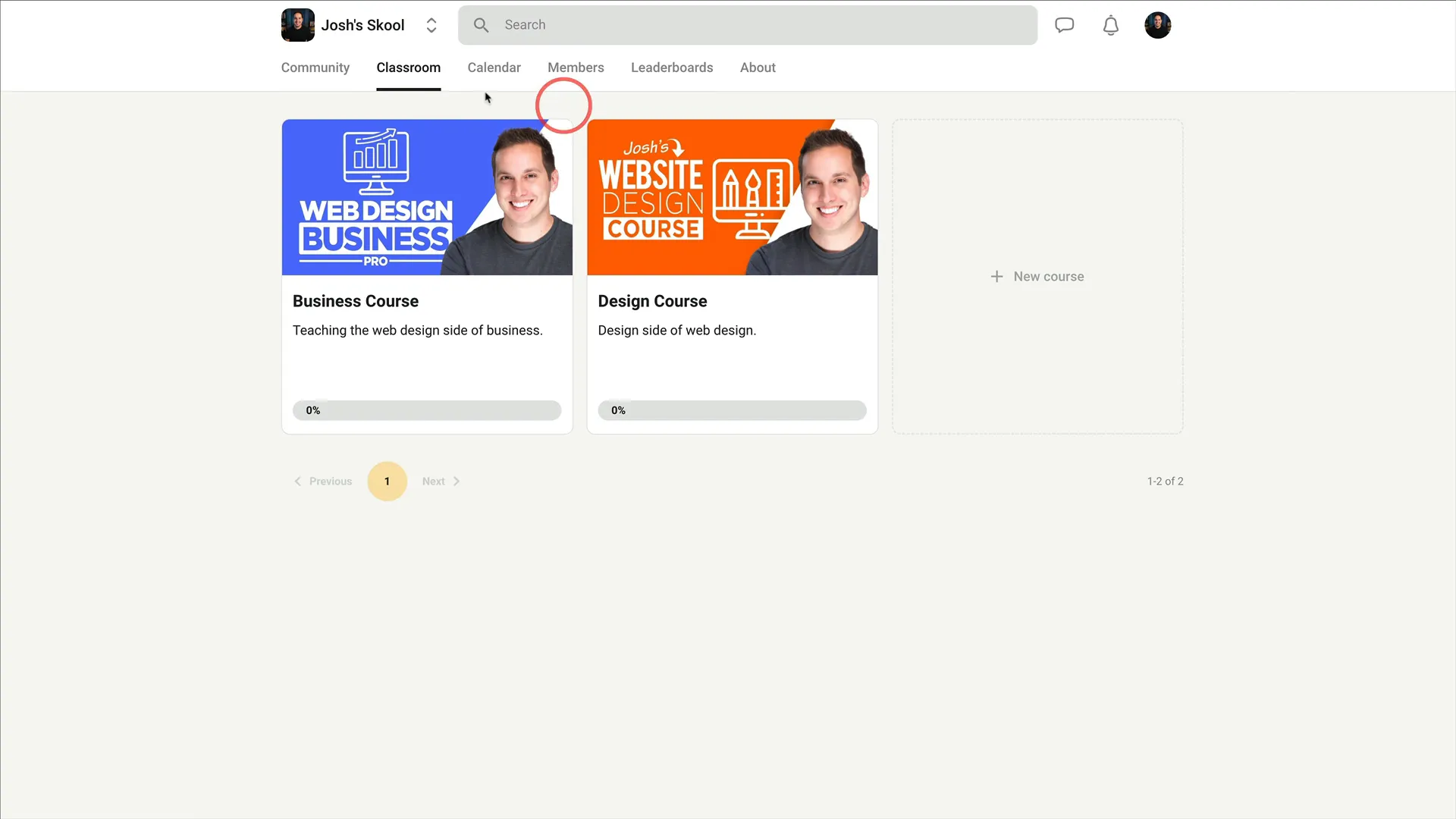
Community Forums
Forums are vital for member engagement, and here Circle shines with its ability to host multiple forums or “spaces.” For instance, a thriving community can have dedicated forums for general discussions, wins, challenges, and more, allowing members to focus on topics relevant to them.
Skool also offers forums but limits you to topics within a single forum, which can quickly become cluttered as the community grows. If you’re serious about growing Skool community, understanding these limitations is important because managing multiple communication lines efficiently keeps members engaged and reduces overwhelm.
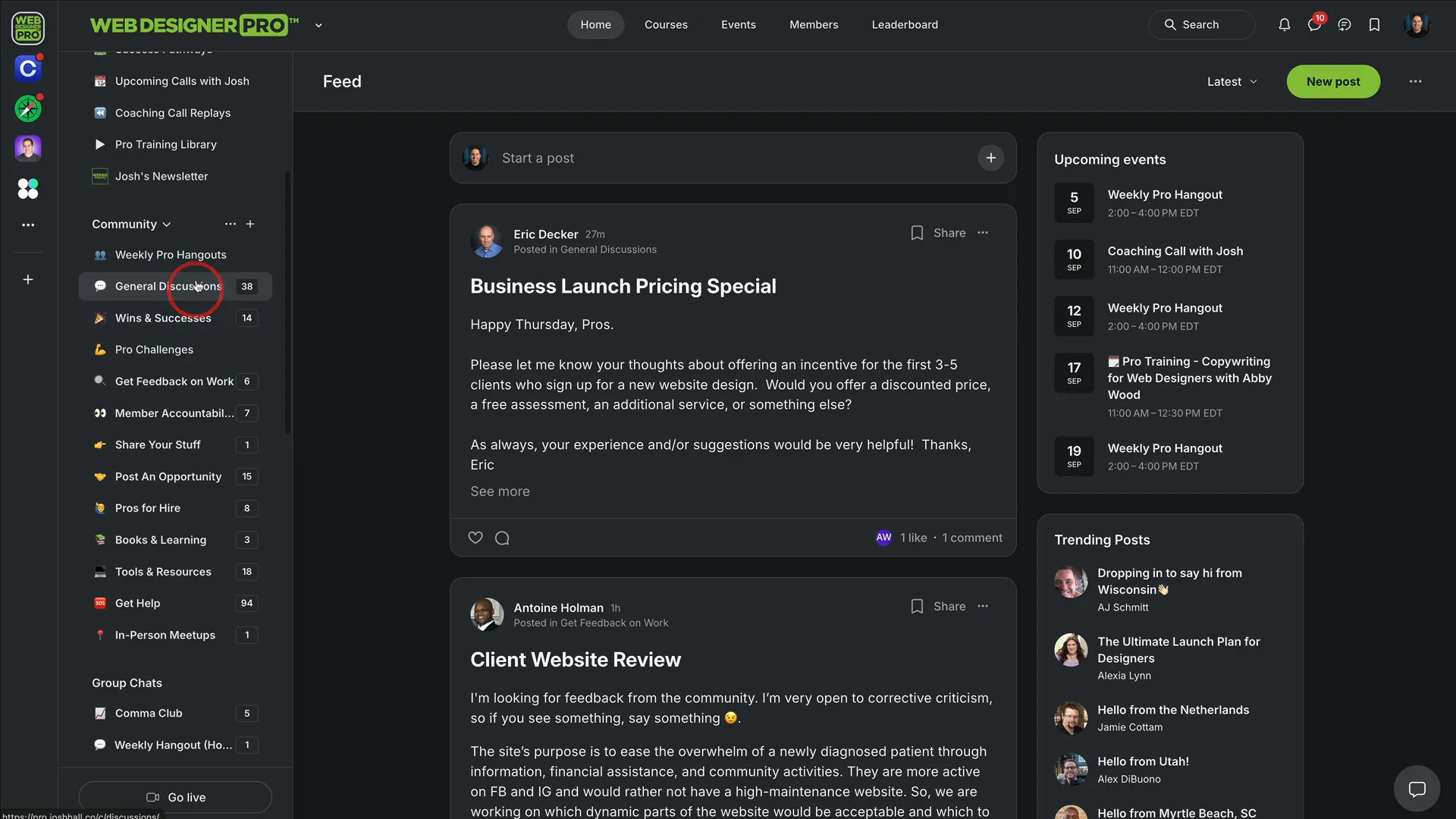
Events
Both platforms provide event features to schedule and manage community happenings. Circle allows highly customizable event views including calendar and list formats, and you can integrate events directly into forums or spaces. Skool offers calendar and list views but with fewer customization options.
Circle supports various event types, including in-person, external links, native live streams, and live rooms, providing a versatile event experience. Skool presently relies on external tools like Zoom or Google Meet for live interactions, which means additional setup and management.
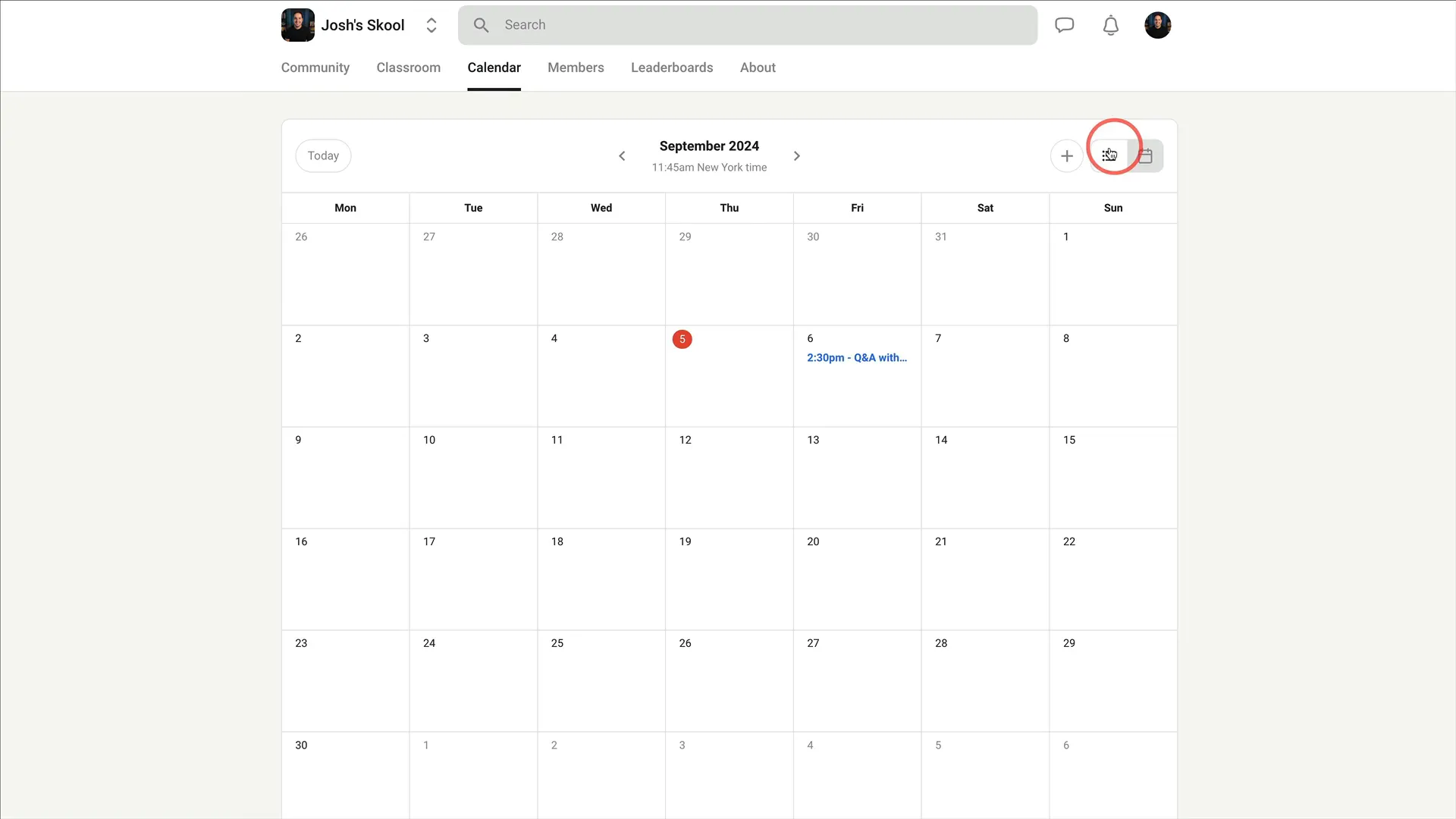
Payments
Native payment options are essential for monetizing memberships. Both Circle and Skool allow you to set subscription tiers and prices within their platforms, removing the need for third-party payment processors.
Circle’s paywalls are notably more advanced, supporting multiple subscription groups, one-time payments, and segmented access. Skool’s payment system is simpler but effective for straightforward membership models.
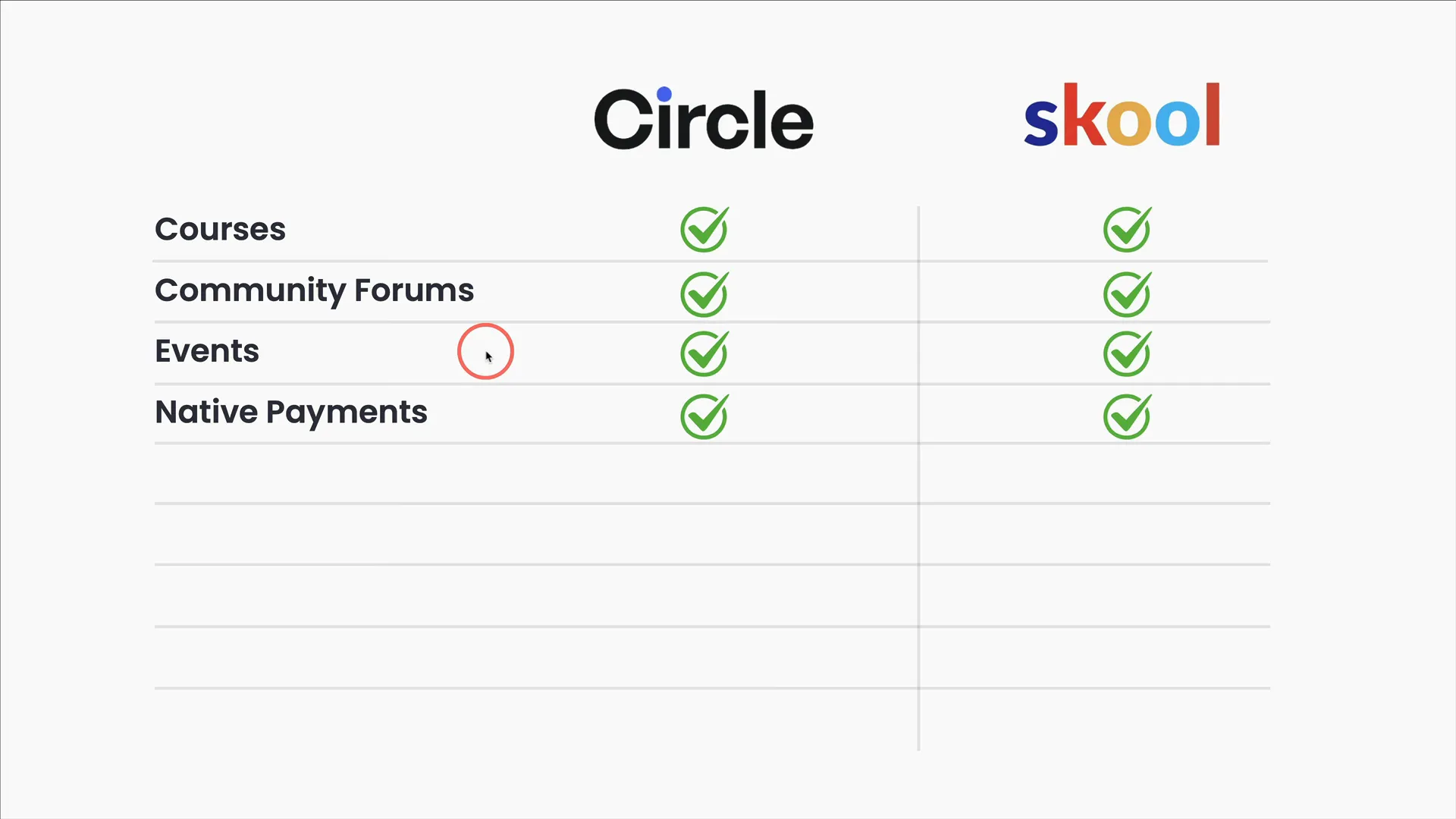
Member Directory
Member directories help foster connections within your community. Both Circle and Skool include directories, but Circle offers a more robust and customizable experience. You can filter members by custom profile fields and tags, which is invaluable for matchmaking, networking, and collaboration.
Skool’s directory is more basic, with limited filtering and no custom tags, posing challenges as your community grows.

Direct Messaging
Circle supports both one-on-one messaging and group chats, enabling dynamic member interactions. Skool’s direct messaging is limited to one-on-one conversations, which may restrict group collaboration opportunities.
Gamification
Gamification has been a strong suit for Skool, offering leaderboards, levels, and unlockable content to motivate member participation. Circle has recently introduced gamification features, including leaderboards and rewards, and is actively developing more advanced unlock features.
Mobile Apps and Roadmaps
Both platforms provide iOS and Android apps, ensuring members can engage on the go. Transparency in development is also important; Circle offers a detailed public roadmap of upcoming features, while Skool’s roadmap is less detailed.
Step 2: Explore What Circle Offers Beyond Skool
While both platforms share many features, Circle stands out with several advanced capabilities that make it a powerful choice for growing and managing large, dynamic communities.
Multiple Forums and Space Types
Circle’s ability to create multiple forums (or spaces) is a game changer. You can segment your community into distinct areas such as general discussion, challenges, wins, coaching calls, and more. Each space can have its own type: feed, forum, chat, event, course, member directory, or gallery.
This level of segmentation and customization allows you to tailor the community experience to member preferences and your business goals, something Skool currently does not offer.
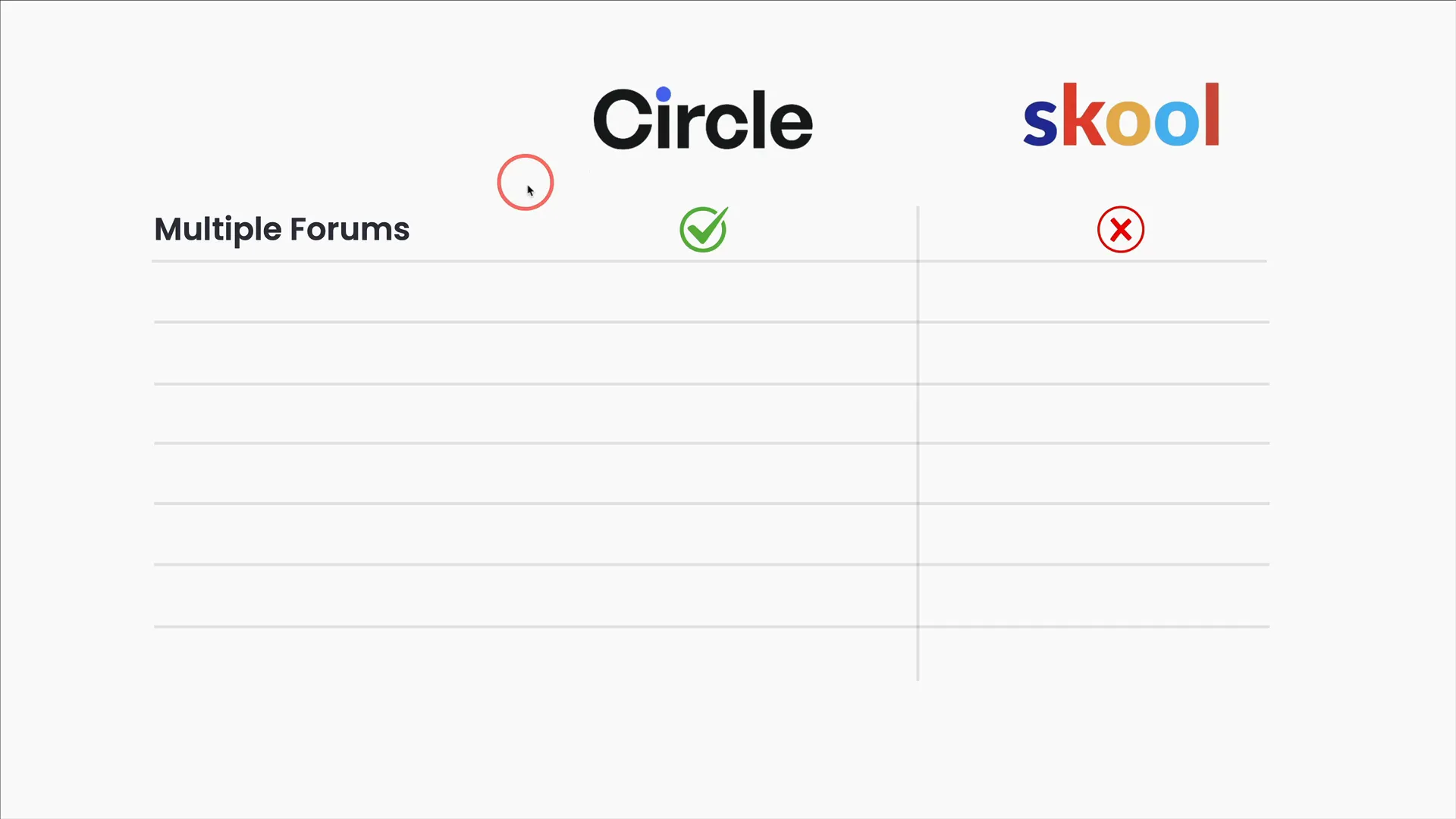
Native Live Streaming and Rooms
Circle provides native live streaming and video rooms, eliminating the need for external tools like Zoom. You can host webinars, workshops, or casual hangouts directly within the platform. Additionally, you have access to attendance data, chat downloads, recordings, and transcripts.
Skool relies on integrations with Zoom or Google Meet for live events, which may complicate the user experience and require managing multiple platforms.
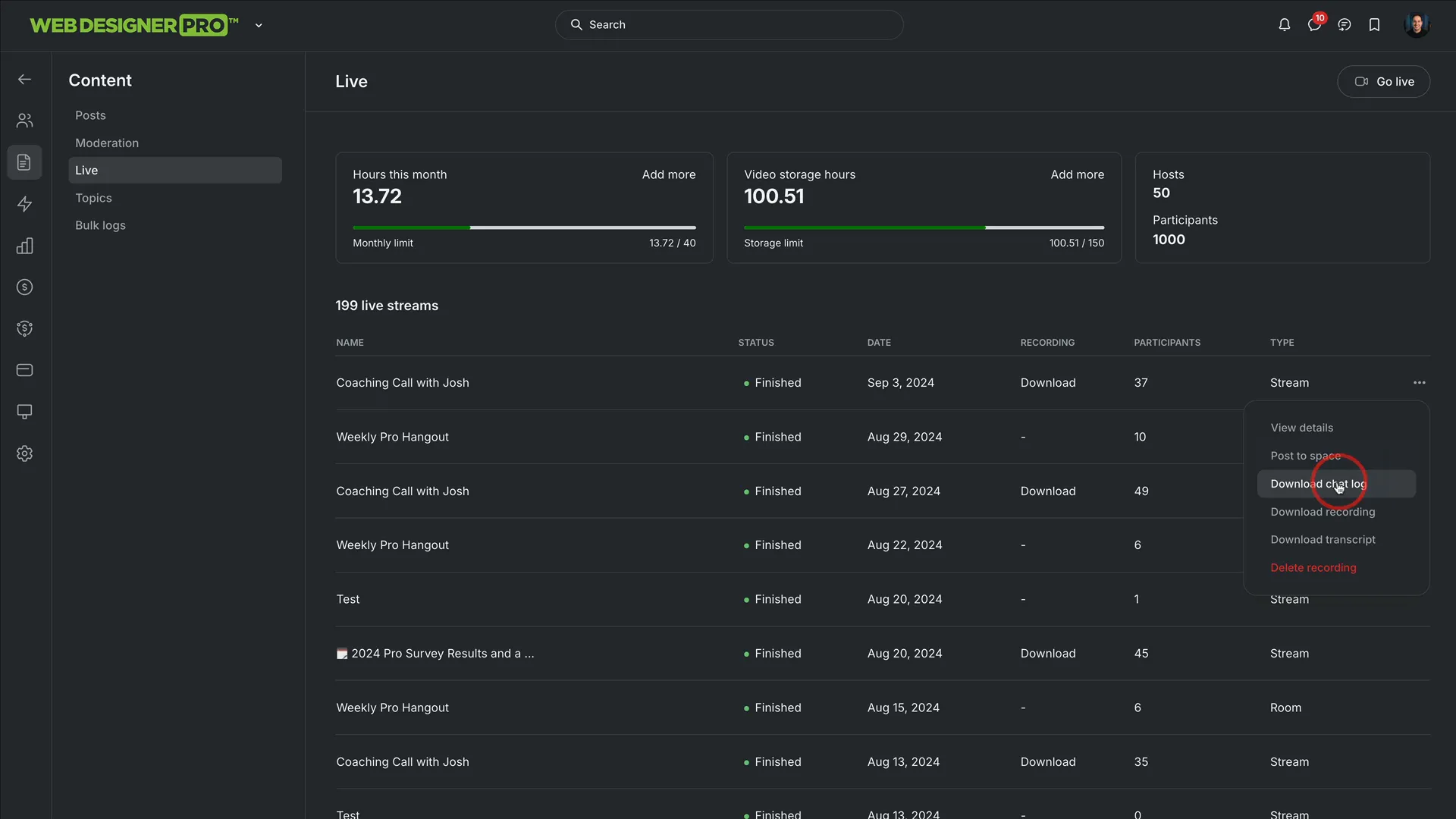
Video Hosting
Circle includes native video hosting, allowing you to upload and manage videos without third-party services like Vimeo or Wistia. You can control storage, embed videos in spaces, and download recordings or transcripts effortlessly.
This feature simplifies content management and keeps everything centralized, whereas Skool requires external video hosting.
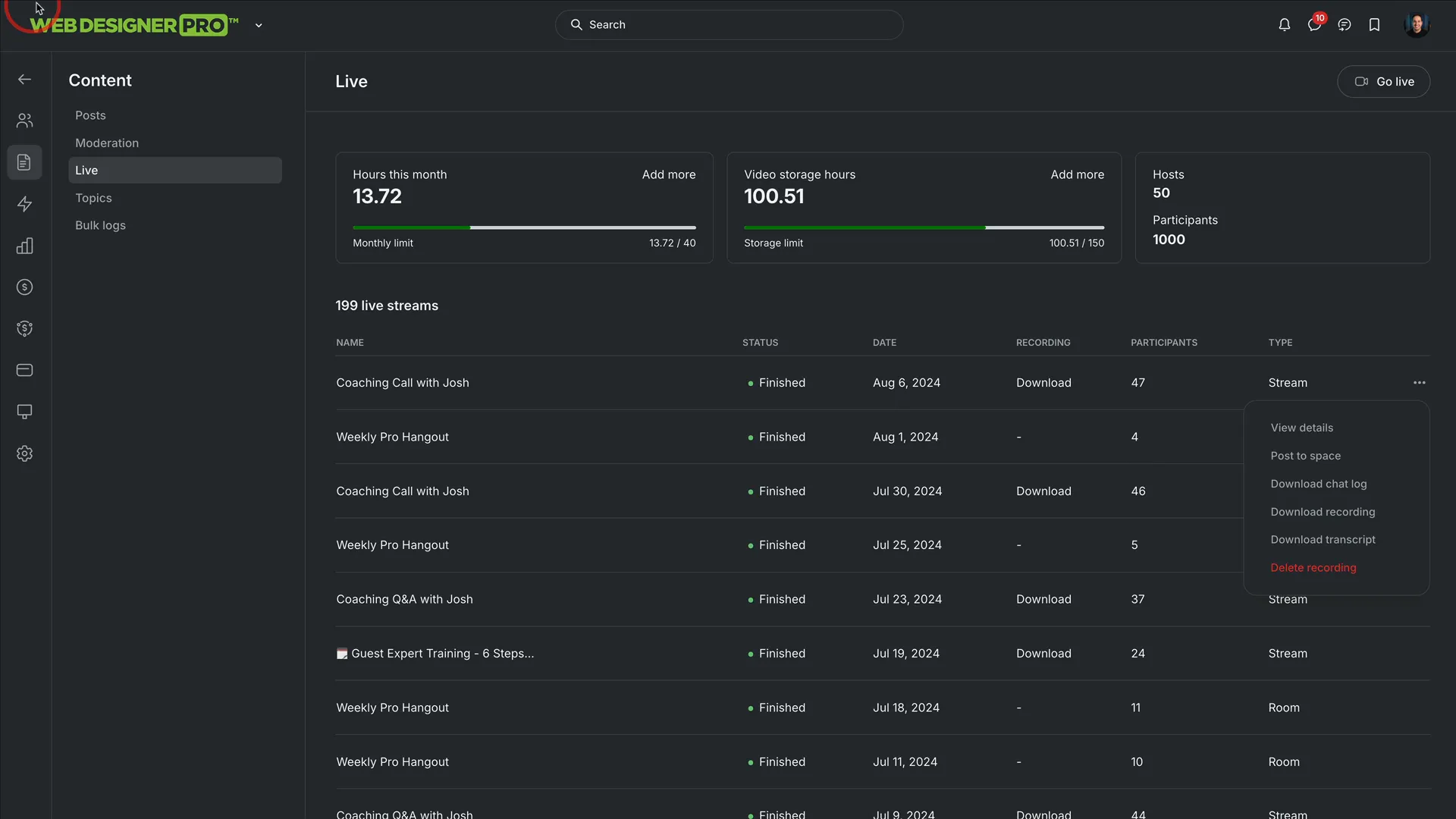
Advanced Post Creation and Scheduling
Circle offers rich post creation tools with attachments, polls, videos, links, and formatting options. Importantly, you can save posts as drafts and schedule them for future publication, enabling better content planning and consistency.
Skool’s post creation is more basic, lacking draft saving and scheduling features, which could slow down content workflows.
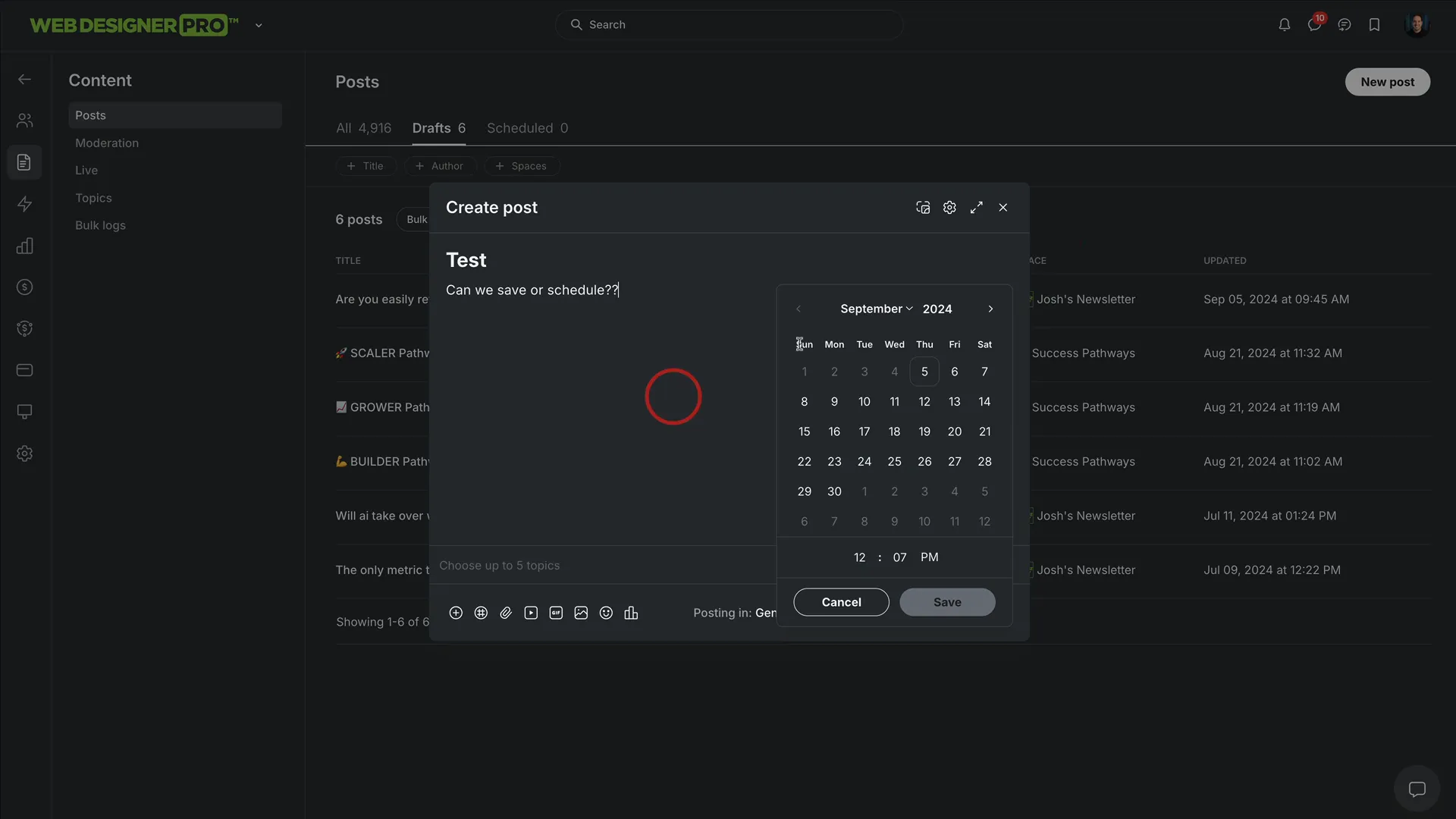
Access Controls and Layout Customizations
Circle allows you to set access levels for spaces: open, private, or secret. This lets you create exclusive groups or content for specific member tiers. You can also customize the layout of each space, choosing between feed, list, or card views, and control commenting permissions.
Skool has limited access control and layout options, which may restrict your ability to create nuanced member experiences.
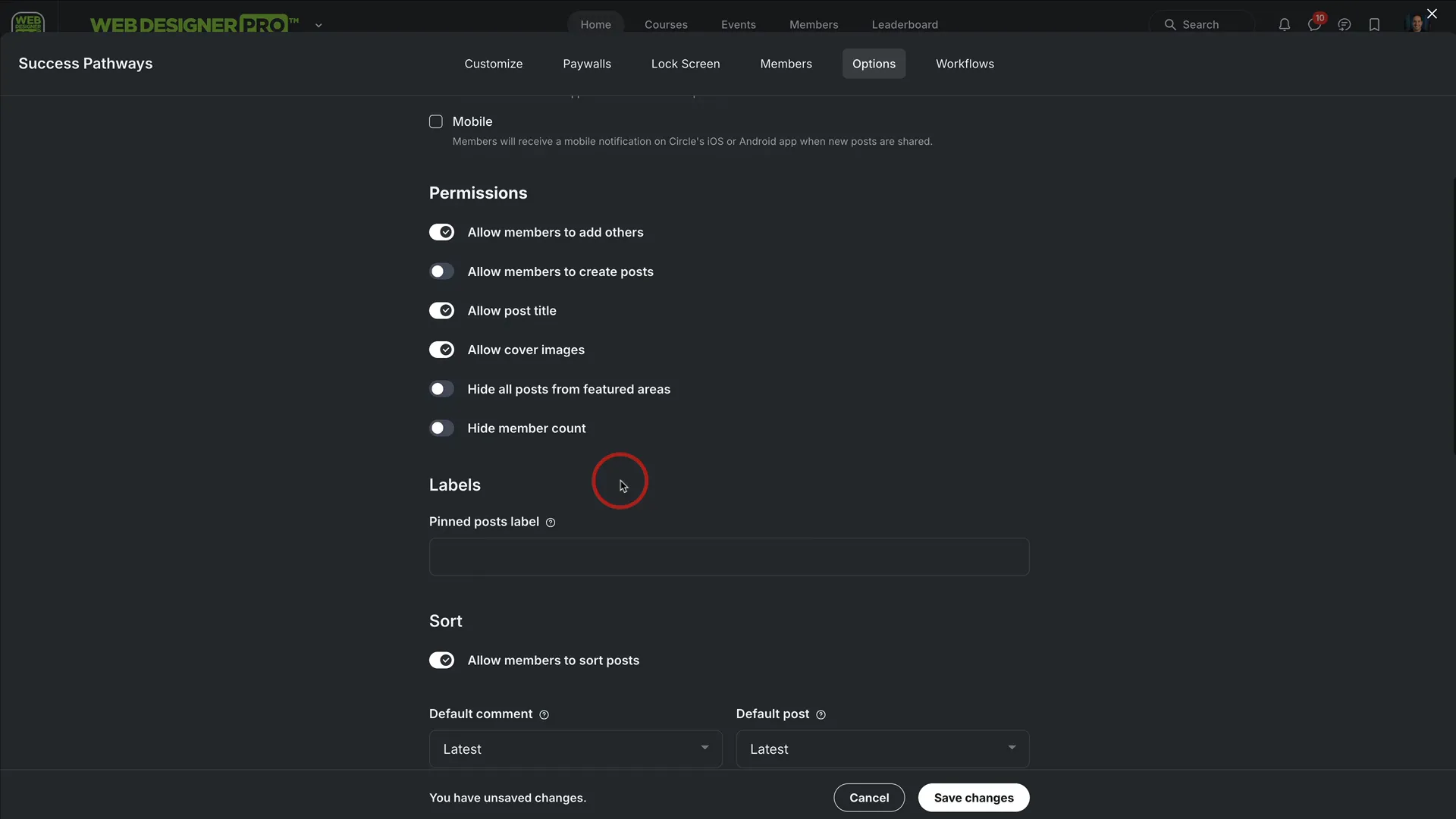
Custom Profile Fields and Tags
Circle lets you add custom fields to member profiles, such as expertise, specialties, or revenue, making it easier to connect members with similar interests or skills. Tags enable you to categorize members for targeted communication and workflows.
Skool lacks custom profile fields and member tags, which can hinder community networking and segmentation.
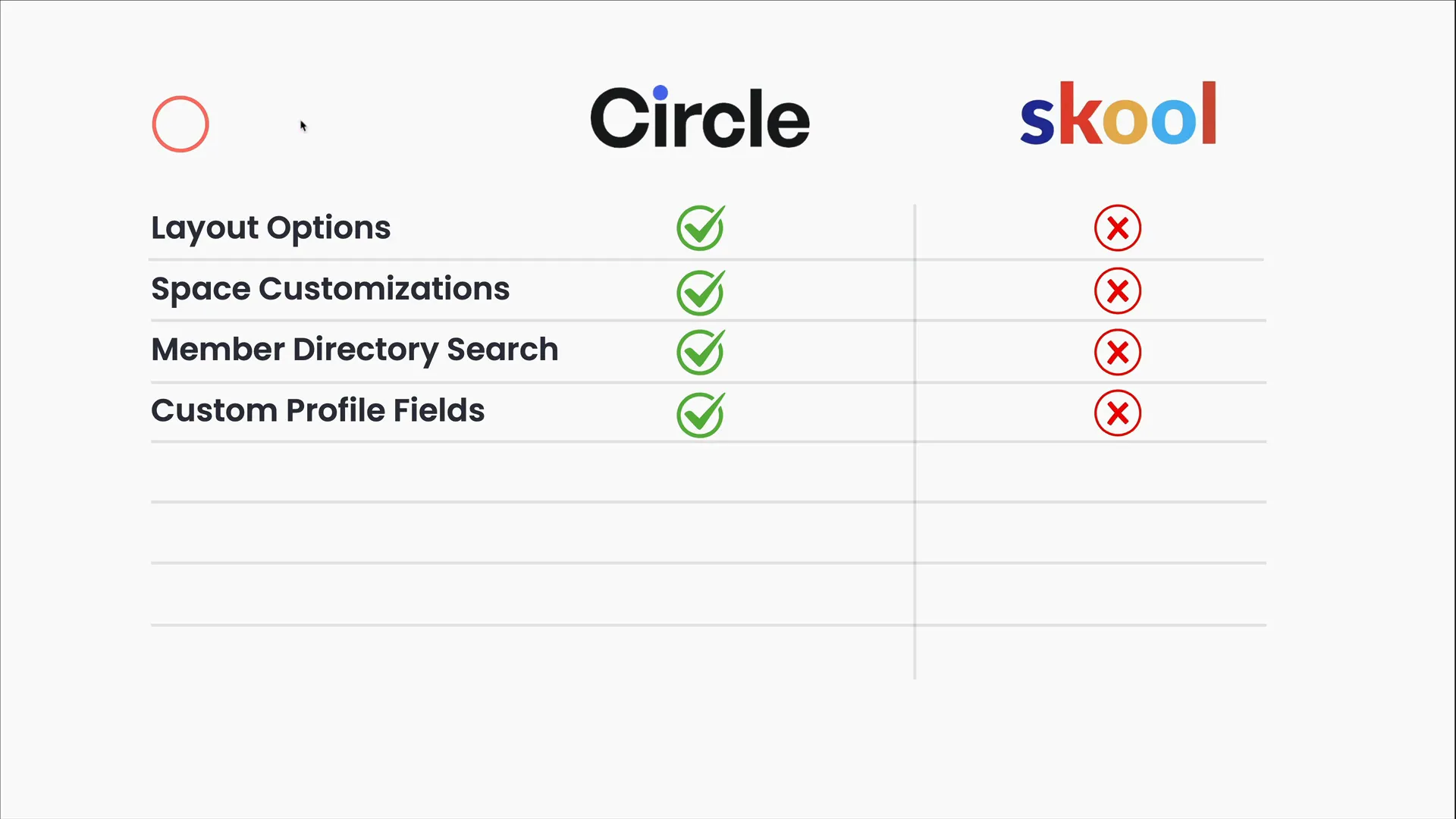
Custom Invite Links and White Labeling
Circle provides custom invite links that grant access to specific spaces or paywalls, useful for onboarding or trial offers. You can also white-label your community with a custom domain, enhancing brand professionalism.
Skool does not currently offer custom invite links or white labeling, meaning your community remains under the Skool domain.
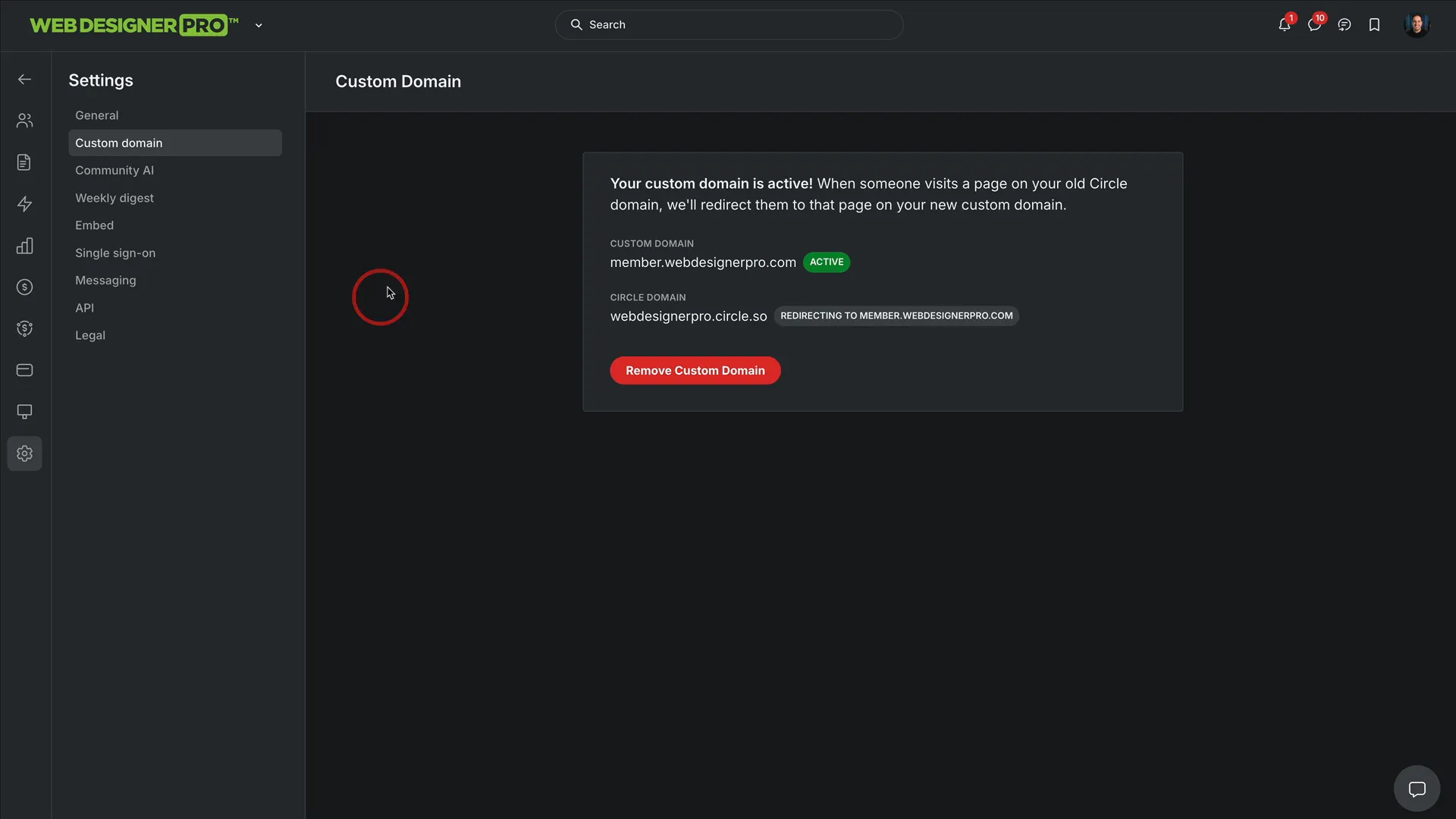
Workflows and Automation
Circle features native workflows for automations like welcome messages, bulk messaging, and onboarding sequences—akin to an integrated CRM. This helps automate engagement and retention efforts without external tools.
Skool has no native workflow automation, so you may need additional software to handle these processes.
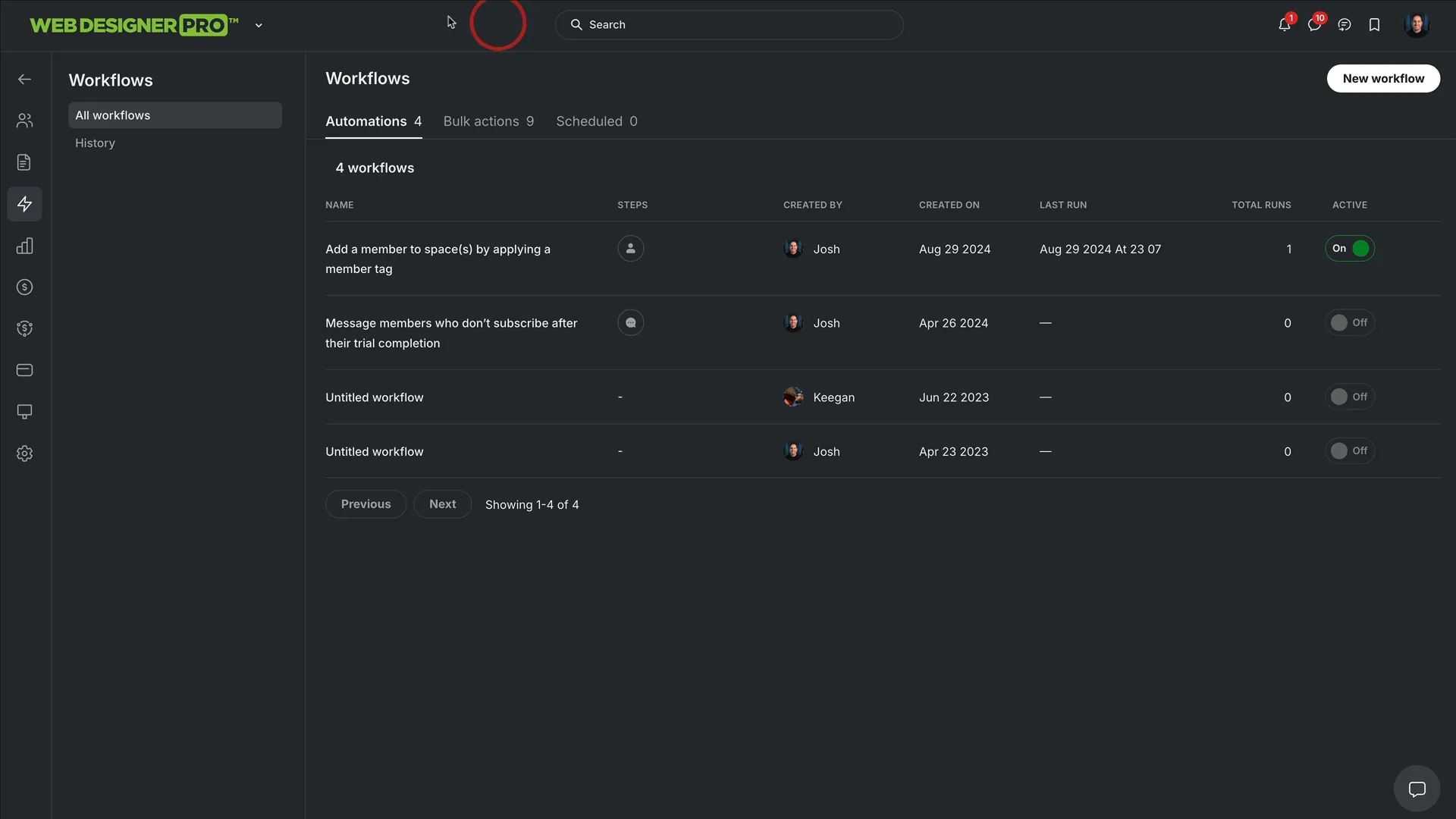
Notification Management and Analytics
Circle offers granular control over notifications, allowing members to customize what alerts they receive to avoid overwhelm. Its advanced analytics give deep insights into community activity, engagement, and popular content, which ties into its gamification features.
Skool provides more limited notification options and lacks comprehensive analytics dashboards, which can make data-driven growth challenging.
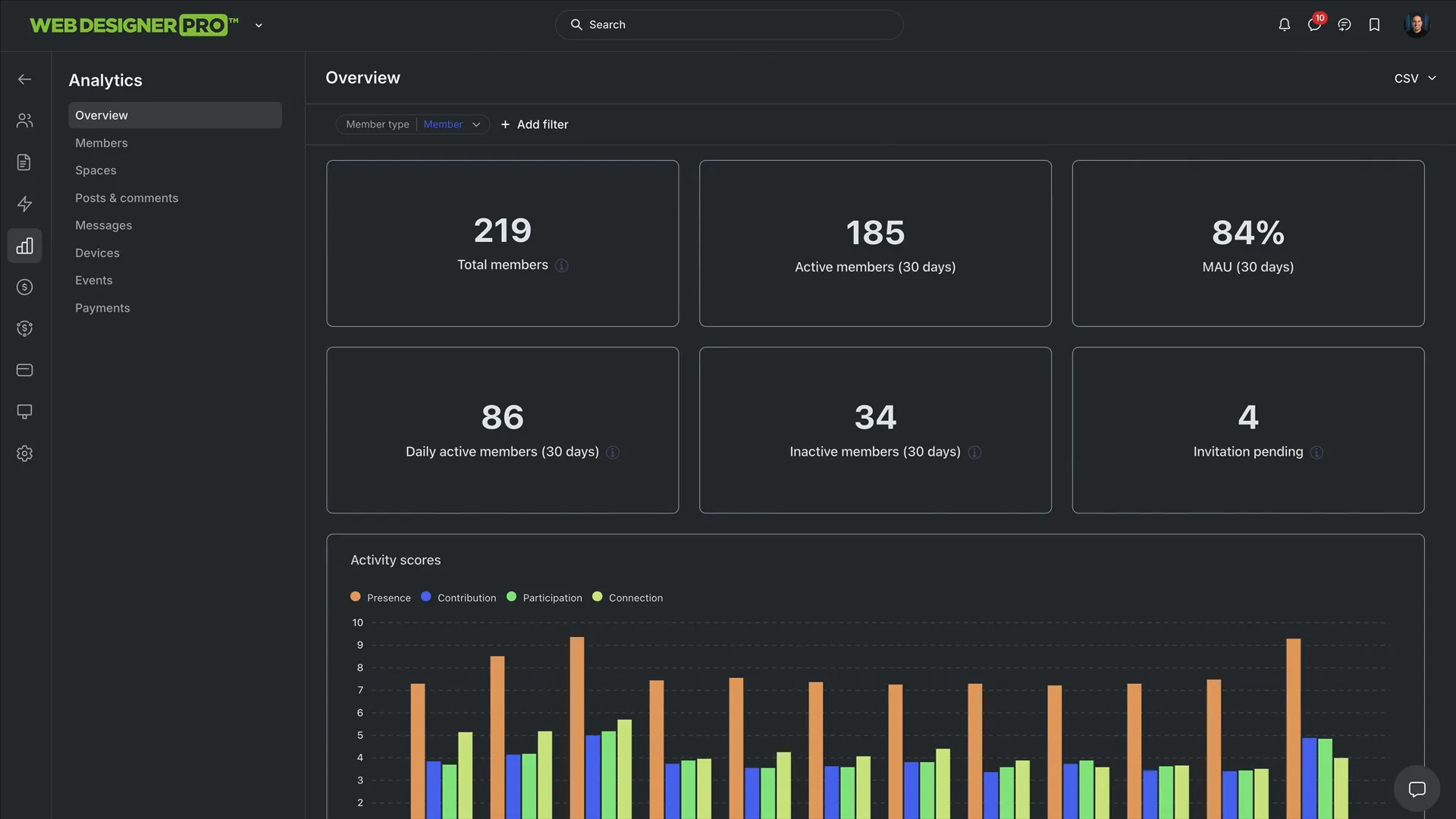
Course Quizzes, SSO, Embedding, AI, and Integrations
- Course Quizzes: Circle supports quizzes within courses, a feature Skool currently lacks.
- Single Sign-On (SSO): Circle can integrate with external platforms for seamless login, whereas Skool requires separate sign-ins.
- Embedding: Circle communities or spaces can be embedded into external websites, expanding your content reach.
- Community AI: Circle includes AI tools to assist with workflows, transcriptions, and searchability; Skool does not yet offer AI features.
- Advanced Integrations: Circle supports numerous integrations with other tools, giving you more flexibility in your tech stack.
Step 3: Recognize the Strengths of Skool Over Circle
While Circle boasts many advanced features, Skool offers some advantages that might appeal to certain community builders, especially those prioritizing simplicity and discoverability.
Turnkey Setup
Skool is designed for quick and easy setup. You can get your community live in as little as 15 minutes without extensive configuration. This makes it a great choice if you want a straightforward, no-fuss platform to start growing your Skool community rapidly.
Circle can also be simple to start with, but its customization options mean initial setup might take longer as you tailor the experience.
Community Marketplace
Skool promotes a marketplace environment where communities are discoverable within the platform. This can lead to organic member growth by exposing your community to people browsing related groups.
However, some prefer to avoid marketplace dynamics to maintain a more private or branded community experience, which Circle better supports.
Bundled Email Notifications
Skool allows members to bundle email notifications, reducing inbox clutter by consolidating updates. This feature supports better member retention by preventing notification fatigue.
Circle currently lacks bundled email options but may add this in future updates.
Lower Transaction Fees
Skool uses a native payment processor with a flat 2.9% transaction fee, slightly lower than Circle’s Stripe fees of 2.9% plus 30 cents per transaction. While the difference is minimal, it could add up with high membership volumes.
Level Unlocks for Courses
Skool offers course unlocks based on gamification levels, making it easy to gate content for members as they progress. Circle is developing similar features but currently requires workflows to set this up.
Backing by Influential Entrepreneurs
Skool has the support of notable entrepreneurs like Herb Mosey, which can be reassuring for some users looking for a platform backed by influential figures.
Step 4: Weighing Your Options – Which Platform is Right for You?
Choosing between Circle and Skool depends on your community’s specific needs, growth plans, and how much control you want over the member experience.
- If you want a simple, quick-to-launch community with a built-in marketplace and gamified engagement, Skool is an excellent choice. It’s particularly suited for those who want to grow Skool community without diving deeply into customization or managing multiple tools.
- If you seek a highly customizable, robust platform that integrates courses, forums, live streaming, video hosting, and workflows into one ecosystem, Circle may better serve your long-term growth. Circle’s advanced features support complex community structures and scaling.
Both platforms offer mobile apps, native payments, and essential community features. However, Circle’s flexibility and depth come with a steeper learning curve, while Skool’s simplicity may appeal to those prioritizing ease of use.
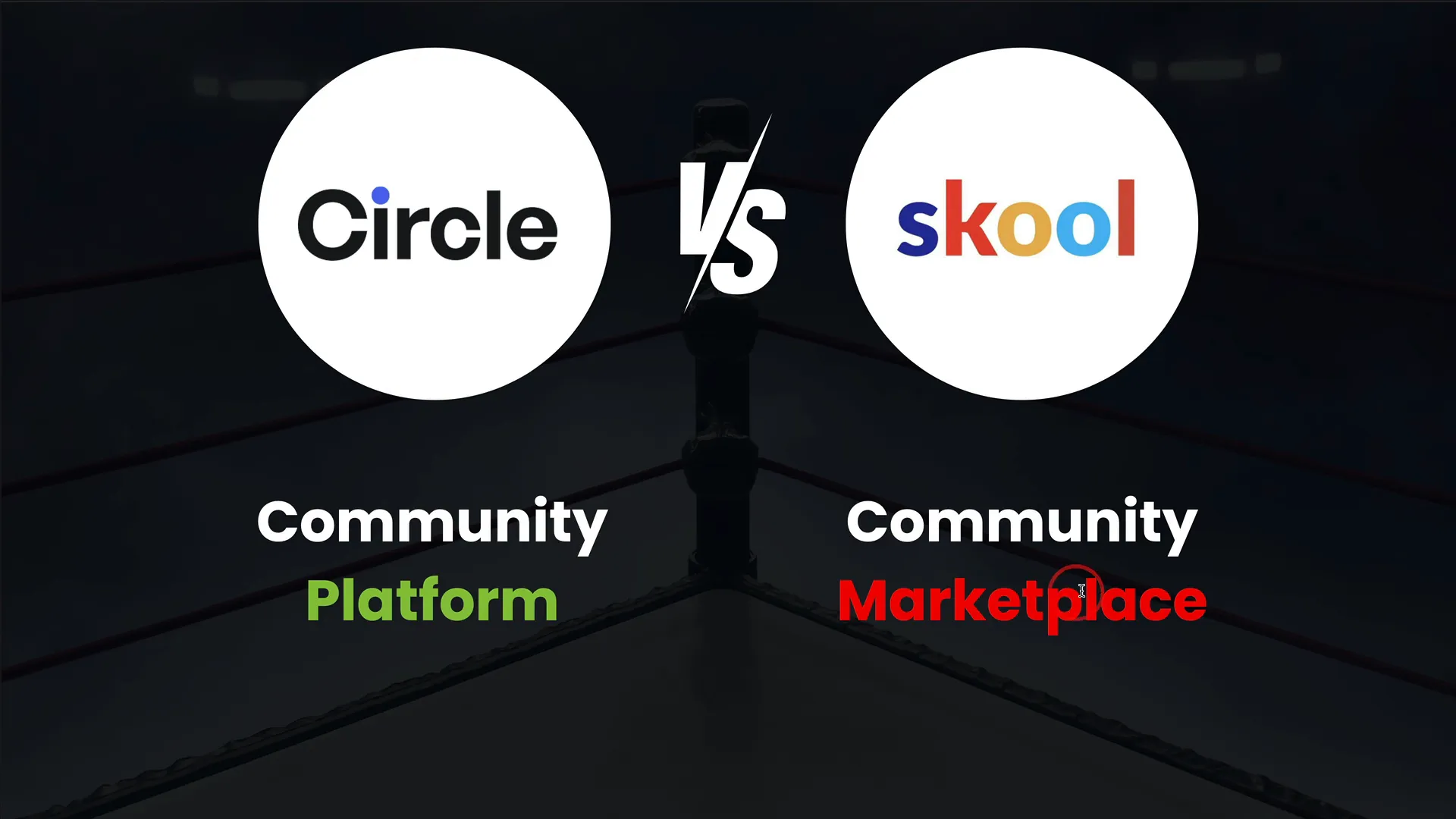
Step 5: Tips for Growing Your Skool Community
If your goal is to grow Skool community effectively, here are some practical tips:
- Leverage the Marketplace: Use Skool’s community discovery features to attract new members by positioning your community clearly within relevant categories.
- Utilize Gamification: Engage members with leaderboards and unlockable content to encourage participation and retention.
- Bundle Communications: Take advantage of bundled email notifications to keep members informed without overwhelming them.
- Keep Setup Simple: Use Skool’s turnkey setup to launch quickly and iterate based on member feedback.
- Integrate External Tools: Since Skool relies on external video and live tools, ensure smooth integrations with Zoom and Vimeo to provide seamless content delivery.
- Focus on Content Quality: Regardless of platform, valuable, engaging content drives community growth. Plan courses, events, and discussions that resonate with your audience.
FAQ: Growing Skool Community and Platform Comparisons
Can I customize the look and feel of my Skool community?
Skool offers limited customization options compared to Circle. You can adjust some settings but cannot fully white-label or customize navigation. If branding is a priority, this is a consideration.
Does Skool support live streaming natively?
No, Skool currently relies on integrations with Zoom or Google Meet for live events. Circle offers native live streaming and rooms.
Are there native payment options in Skool?
Yes, Skool has native payment processing with a flat 2.9% transaction fee. This simplifies payment management but offers fewer tiering options compared to Circle.
Can I run automated workflows in Skool?
Skool does not currently support native workflows or automations. Circle offers built-in workflow automation for messaging and onboarding.
Which platform is better for larger communities?
Circle’s robust member directory, filtering, and multiple forums make it better suited for large, complex communities. Skool is better for smaller, simpler groups.
Is Skool a marketplace for communities?
Yes, Skool promotes itself as a community marketplace, allowing users to discover and join various communities. This can help with organic growth but may not suit those wanting a private, branded space.
How do transaction fees compare?
Skool charges a flat 2.9% fee per transaction, while Circle uses Stripe with 2.9% plus 30 cents per transaction. The difference is minor but worth considering for high-volume sales.
Does Skool support course progress tracking?
Yes, Skool has course progress bars, which Circle does not currently offer but plans to add.
Can I schedule posts in Skool?
No, Skool lacks post scheduling and draft saving features, which Circle supports.
Conclusion: Making the Right Choice to Grow Skool Community
Both Circle and Skool present viable options for building and growing online communities, each with unique strengths. Skool’s simplicity, turnkey setup, and gamified marketplace make it an appealing platform for those seeking a quick launch and organic member discovery. If you want to grow Skool community with ease and leverage a marketplace environment, Skool is a strong contender.
On the other hand, Circle offers unmatched customization, native live streaming, integrated video hosting, advanced workflows, and detailed analytics, making it ideal for complex, growing communities that require more control and flexibility.
Ultimately, your choice depends on your priorities: simplicity and discoverability with Skool or customization and all-in-one robustness with Circle. If you’re ready to take the plunge and grow Skool community with a platform designed to get you started fast, Skool is a smart choice that won’t hold you back as you scale.
Whichever platform you choose, focus on creating valuable content, fostering authentic connections, and engaging consistently with your members. That’s the true key to thriving online communities.
Ready to Build Your Skool Community?
Start your 14-day free trial today and turn your expertise into a thriving, profitable community that members love.
Start Free Trial